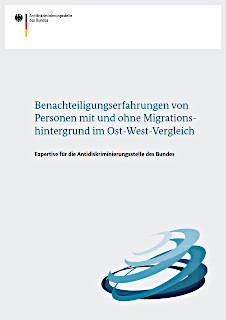Discrimination Experiences
of Persons with and without
a Migrant Background
including an East/West Comparison
- Factsheet on the research project -
Authors: The Expert Council of German Foundations on Integration and Migration (SVR), published by the Federal Anti-Discrimination Agency (FADA) Year of publication: 2012
Brief overview
This expert opinion investigates the experiences of discrimination had by persons with and without a migrant background living in Germany. The survey focused on the personal, subjective experience of discrimination over the previous 12 months.
The questions covered eight aspects of life in which discrimination occurs:
- education,
- work,
- public offices and public authorities,
- neighbourhood,
- exercise of religion,
- recreational activities,
- public transport,
- house hunting.
The list is based on the ‘Integration Barometer’ – Data Collection by the Expert Council of German Foundations on Integration and Migration (SVR).
Who was interviewed?
- A total of 9,200 persons took part in the telephone survey, 76.8 per cent of whom were persons with a migrant background and 23.2 per cent without.
- The survey was conducted in summer 2011 in the West German Rhine-Ruhr, Stuttgart and Rhine-Main regions and in the East German regions of Berlin-Brandenburg and Halle-Leipzig.
- Of the respondents of migrant background, 13.3 per cent were of Turkish origin, 17.4 per cent originated from EU Member States, 16.1 per cent from European states outside of the EU and 14.6 per cent were of African, Asian and Latin America origin.
- The survey was also offered in Russian, Turkish and Vietnamese.
Main results
Discrimination experiences in different areas of life
- Persons with a migrant background reported almost twice as often that they experienced discrimination compared with the majority population. Some 41.9 per cent of respondents with a migrant background and around 25 per cent of respondents without a migrant background stated that they had been the victim of discrimination in the previous 12 months.
- Of the respondents with a migrant background, 9.4 per cent indicated that they had experienced “very strong” or “rather strong” discrimination while house hunting, 10 per cent while job hunting, 6.5 per cent in education and 9 per cent at public offices and authorities. However, not all of the areas of life investigated – such as education or house hunting – were equally relevant for the respondents at the time of the survey.
- In absolute figures, most respondents with migrant background indicated that they had experienced discrimination at public offices and authorities (1,339 respondents) as well as on the labour market (1,156 respondents).
Especially visible minorities and Muslims report discrimination
- Especially visible minorities, such as persons with a Turkish migrant background and persons of African/Asian/Latin American origin, experienced discrimination comparatively often: 31.3 per cent of respondents with a Turkish migrant background and 33.3 per cent of respondents of African/Asian/Latin American origin experienced discrimination on the employment market. More than one-third of the respondents from these groups also experienced discrimination at public offices and/or authorities (Turkish background: 31.6 per cent; African, Asian, Latin American background: 31.5 per cent). Also while seeking accommodation, almost one-third of the respondents in these groups felt they had been discriminated against (Turkish origin: 30.6 per cent; African/Asian/Latin American origin: 27.9 per cent). Alarmingly, moreover, 23.7 per cent of respondents with a Turkish migrant background, as well as 20.9 per cent of respondents of African/Asian/Latin American origin experienced discrimination in their neighbourhood.
- The group of ethnic German immigrants and late repatriates experienced the greatest discrimination on the labour market with 23.1 per cent.
- Muslims indicated a significantly higher number of discrimination experiences. For example, 38.2 per cent of respondents from the group of African/Asian/Latin American origin who belonged to the Muslim confession experienced discrimination on the labour market (Christians: 31.6 per cent; non-religious: 28.8 per cent).
No difference between East and West
An East Germany – West Germany comparison revealed no significant difference in the personal experience of discrimination.
The majority population takes a sceptical view of diversity
The majority population, for the most part, is more sceptical of ethnic diversity than the immigrant population. For example, the approval of diversity in the neighbourhood, the education system and at the workplace is lower among persons without a migrant background than among persons with a migrant background.
Options for action
What can the Federal Laender and the municipalities do?
The results of the expert opinion demonstrate the need to consistently work against discrimination. This is only feasible with the support of the Federal Laender and the municipalities. To this end, the Federal Anti-discrimination Agency has created a ‘Coalition against Discrimination’ to develop joint strategies against discrimination:
- Protection against discrimination must be established as a responsibility at Land and municipal level.
- Migrants must have access to the best possible counselling in the event of discrimination.
- Public offices and authorities must apply, more than has hitherto been the case, the instruments intended to promote equality and combat discrimination.

